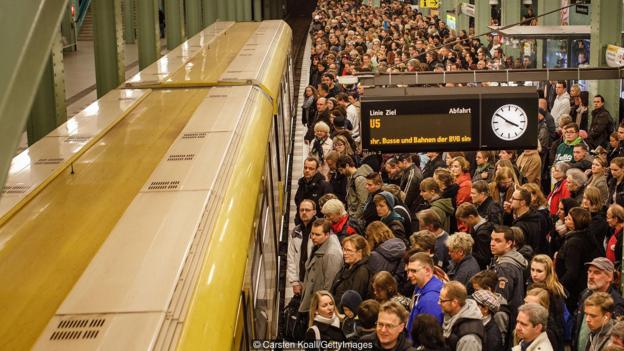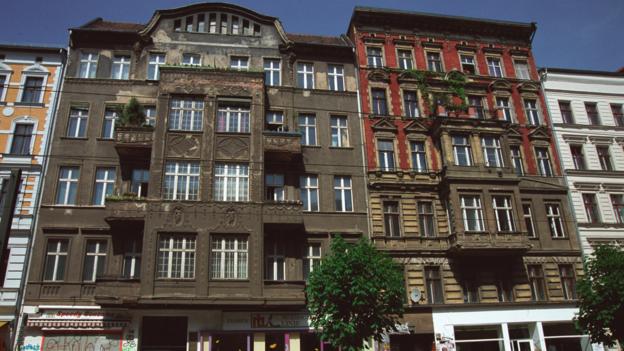Viewing 50 flats, but no place to live


B24GHJ Detail of bright red rennovated old building in bohemian Prenzlauer Berg district of Berlin 2008
In 2007, when American Erick Feijóo moved to Berlin for the summer, finding an apartment was a piece of cake. He secured a place to live before arriving in the city.
It used to be a sport, or at least part of the culture here, to move around
But earlier this year, when Feijóo, now 32, tried to find a long-term rental, he ran into a serious problem: sky-high rentals. Even after attending viewings three times a week, he couldn’t lock in an affordable lease on his 800 euros ($903) a month budget.
Feijóo, an international economic policy and public affairs specialist at GE Power, said it used to be easy, “You sent an email and they would beg you to take them in. Now you have to beg them.”
Available apartments have become harder to find
Berlin rent prices pale in comparison to cities like London and New York. But living in the city, once dubbed by a former mayor as “poor, but sexy,” has become dramatically more expensive in recent years and it’s quickly losing its reputation as the promised land for renters. Thanks to a combination of new rent control rules to cap increases and a fast-growing population, available apartments have become harder to find and for those that open up to let, rents have rocketed more than 20% in three years, according to property firm CBRE.
“Berlin is still cool,” said Henrik Baumunk, a managing director at CBRE GmbH. “But for a long time, it hasn’t been poor.”
Rising pressure on rents
Berlin’s population has grown 8% in the last decade to 3.6 million, adding 47,990 people in 2015 alone, according to CBRE. The total number of apartments in the city was 1.89 million in residential and non-residential buildings in 2014. Transplants come from all over Germany, but also other European countries with high unemployment, according to Michael Voigtländer at the Cologne Institute of Economic Research. In addition, refugees and others from further afield are also drawn to the city.
At the same time the city only added 7,030 residential buildings with three or more apartments last year. The discrepancy between newcomers and new apartments has put pressure on rents.

Berlin, Brandenburg Gate in special illumination. Public light event in the german capital.
In an effort to put the brakes on frothing house prices, the government swiftly brought in rent controls in June 2015 that limited rent increases to no more than 10% of the local reference rate for the neighbourhood (this figure is calculated based on the location and quality of the apartments and comparable rents for previous years). But the law makes exceptions for extensively renovated apartments and new builds. In addition, the laws banned the fees that renters were paying to property agents to show apartments and handle rental contracts.
Expats at a disadvantage
The Berlin property market puts expats at a distinct disadvantage, said Katrin Ruland at McKay Relocation Services, which helps firms based in Germany find housing for employees new to German cities. “We’re not the preferred client for landlords,” she said.
With landlords now having their pick of tenants and fewer options to hike rents, they often opt for dual-income German couples who they believe will stay for a longer period of time, she said.
We’re not the preferred client for landlords

BERLIN, GERMANY — NOVEMBER 06: Passengers crowd to the doors of the subway train retracted U5 line at the station Alexanderplatz during a four-day strike by the GDL train drivers labor union on November 6, 2014 in Berlin, Germany. The current strike, which affects passenger travel nationwide from today through Sunday, is the longest in the history of German state rail carrier Deutsche Bahn, which is in an increasingly bitter dispute over wages and working hours with the GDL. (Photo by Carsten Koall/Getty Images)
Asian expats in particular can face discrimination and racism. Potential tenants from Asia face added challenges over, of all things, their traditional cooking and food, said Ruland. “With Chinese and Indian nationalities… even if they have good jobs and good salaries, some landlords say they can’t get the smell out of the apartment,” she said.
Ruland said that she had to show one Indian client, who had a job at the industrial conglomerate Siemens and wore a turban, 52 apartments before calling in a favour from another agent to find him a place to live. She’s also recently struggled to find housing for clients from the Middle East, including a Syrian IT specialist and an Iranian business school professor. With refugees pouring into Germany from Syria and other countries, she said that landlords have become even more resistant to renting to foreigners.
Staying put
The quickly-tightening rental market is a shock to the system for many Berliners.
“It used to be a sport, or at least part of the culture here, to move around,” said Baumunk. Berliners used to find a new apartment when they moved in with a partner or even just for fun. Now more are staying put and holding on to their leases.

A27EJ4 Apartment blocks in Prenslauberg, Berlin.
Baumunk has already noticed that fewer people are moving house, with the turnover rate now at 6% compared with about 10% a few years ago.
Rent controls are now being rolled out nationally, but many experts complain that they just aren’t working out as planned in Berlin. Reiner Wild, head of the Berliner Mieterverein or Berlin tenants association, estimates about a third of the city’s apartments don’t fall under the new rules. And even those that do are so highly-prized that landlords get away with price hikes because tenants don’t want to rock the boat by reporting the rent control law break, he said.
In response, the city is talking about tightening the rules to give tenants more power versus landlords. It’s also limited the ability of people to rent out their apartments on sites like AirBnB. But Voigtländer believes that tighter rules will only make housing harder to find.
While the rapid pace of change is throwing Berliners for a loop, it’s also bringing the city closer in line with other world capitals.
For example, the luxury property market, long-established in other European cities, is booming, according to property broker Ziegert Bank und Immobilienconsulting GmbH. The firm said in a May report that the luxury residential market in the German capital has grown by 20% in 2015 and expects sales to grow another 50% in the next five years, faster than London, Paris and New York.
Employers still find Berlin far more affordable than rival cities
This “is new to Berlin,” said Nikolaus Ziegert, the firm’s managing director. He said that luxury apartment buyers in Berlin are a mix of international residents and Germans from other parts of the country, many of whom plan to live in the units they buy.
Could be worse
Despite the tightening housing market, employers still find Berlin far more affordable than rival cities.
Serafin Lion Engel, founder and CEO of start-up DataWallet, said that even with rising rents he decided to open a second office in Berlin last year, in addition to the company’s San Francisco office where rents are soaring.
“For our operations, Berlin is still about 60% to 70% cheaper than SF, while offering access to fantastic talent that is at par with SF and Silicon Valley,” said Engel in an email.
Even though his company’s employees, mostly in their 20s and unmarried, had trouble finding an apartment close to the company’s headquarters in gentrified Kreuzberg, no one complained or asked for higher salaries. “Demand in the area is insane, even for higher priced units,” he said. “Most of us had more than 10 apartments on our shortlist, but none of us actually ended up living in the part of Kreuzberg where our office is located.”
Политика конфиденциальности | Правила пользования сайтом







